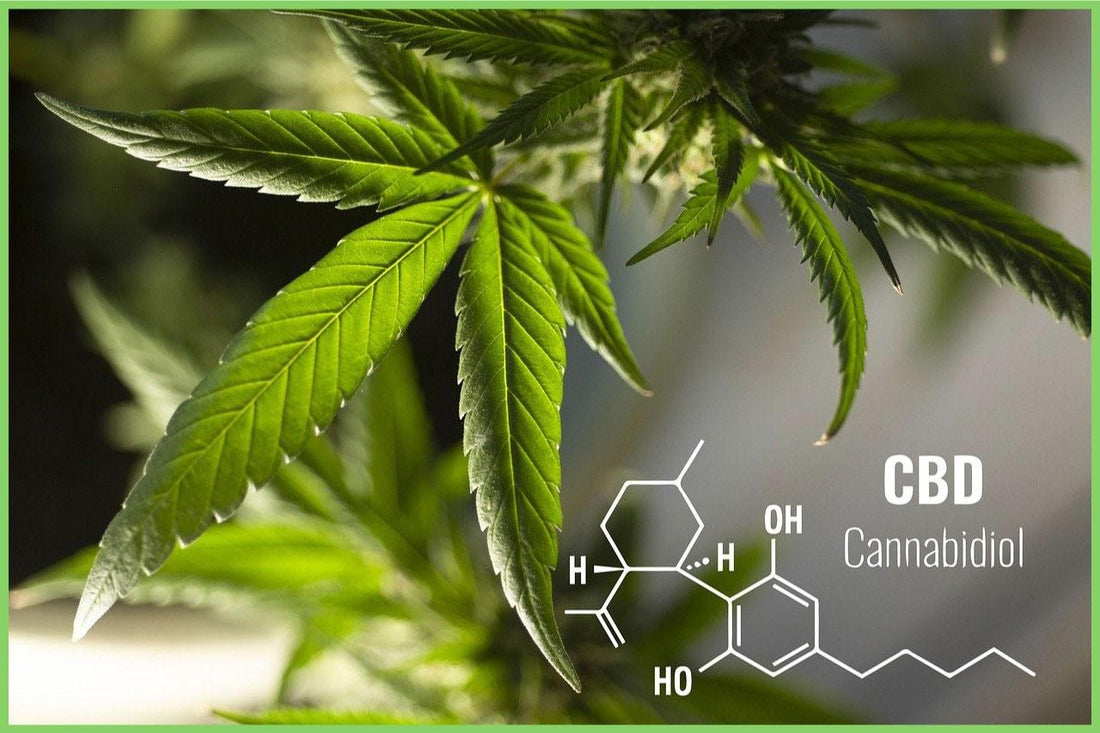
What Is CBD Oil? A Quick CBD Guide For 2020
Share
The cannabis plant, with its recognizable leaves and resonous flower, has a rich history as a remedy stretching back thousands of years. It’s from this plant that Cannabidiol (CBD), a naturally occurring compound, is derived.
CBD has recently come into the forefront of both medical research and widespread home use. The therapeutic and medicinal properties of CBD are being tested and confirmed by scientists and doctors around the world. Lauded as a safe and non-addictive substance, CBD is one of more than a hundred “phytocannabinoids,” which are unique to this plant and are responsible for its numerous pharmacological uses.
https://medlineplus.gov/druginfo/natural/1439.html
What is in CBD that makes it affect our bodies?
The phytocannabinoids in CBD are responsible for its effects on the human body, but what exactly does that mean?
To start, let’s talk about another medicinally active phytocannabinoid that’s found in cannabis: tetrahydrocannabinol (THC). This is the compound that causes the “high” that cannabis is famous for and the chemical that makes marijuana illegal.
Both CBD and THC have been studied extensively, and both have distinct therapeutic attributes. Unlike THC however, CBD does not cause intoxication.. That’s because CBD and THC impact the brain and body in completely different ways.
The fact that CBD is non-intoxicating, non-addictive, and easy to take as a CBD oil, makes it an appealing treatment option for those who are apprehensive about trying cannabis for the first time.
POTENTIAL USES OF CBD
Extensive scientific research and mounting anecdotal accounts from patients and physicians highlight CBD’s potential as a treatment for many afflictions and ailments. The list of possible medicinal uses for CBD is huge, but here are a few key examples:
CBD for Seizures
CBD is often talked about as a possible treatment for epilepsy. In fact, the life-changing effectiveness of CBD in combating seizures in children with certain types of epilepsy may have been responsible for much of its early popularity.

Researchers are continuously testing how much CBD is able to reduce the number of seizures in people with epilepsy, as well as how safe it is, but the future is promising. (And it’s worth mentioning that the only prescription CBD product on the market at the moment, Epidiolex, is an epilepsy medication.)
CBD for Pain relief
Studies have shown that the effects of CBD oil on the brain’s receptors may help manage pain, and preclinical studies in animals have demonstrated that CBD reduces pain and inflammation. (One of the first recorded uses of cannabis was to treat pain associated with rheumatism, otherwise known as arthritis.)
We humans experience two primary types of pain: musculoskeletal and nerve. Houman Danesh, MD, director of integrative pain management for the Mount Sinai Hospital in New York City says "There could be benefit for both conditions," with regards to CBD.
https://healthblog.uofmhealth.org/health-management/should-you-take-cbd-for-pain
CANCER TREATMENT WITH CBD
Although research is just beginning to hit its stride, studies are being conducted to explore the role of CBD in preventing cancer cell growth. Although the National Cancer Institute (NCI) doesn’t fully endorse any form of cannabis as a cancer treatment, they recognize that CBD may help alleviate cancer symptoms and cancer treatment side effects.

The future seems promising, as preliminary research tells us that CBD reduces the ability of some types of tumor cells to replicate. CBD has proven neuroprotective effects and a 2010 brain cancer study found that CBD “enhances the inhibitory effects of THC on human glioblastoma cell proliferation and survival.” If nothing else, we know that CBD improves the cancer-fighting properties of THC.
https://www.ncbi.nlm.nih.gov/pubmed/20053780
ANXIETY
CBD might be worth trying to manage anxiety symptoms. The compound tells your body to calm down and mellows out the nervous system so you're not in a heightened 'fight or flight' response. This effect helps many people with anxiety to feel more relaxed.
https://www.health.com/condition/pain/what-is-cbd
What else is CBD oil used to treat?
- Autoimmune diseases (inflammation, rheumatoid arthritis)
- Neurological conditions (Alzheimer’s, dementia, Parkinson’s, multiple sclerosis, epilepsy, Huntington’s chorea, stroke, traumatic brain injury)
- Metabolic syndrome (diabetes, obesity)
- Neuropsychiatric illness (autism, ADHD, PTSD, alcoholism)
- Gut disorders (colitis, Crohn’s)
- Cardiovascular dysfunction (atherosclerosis, arrhythmia)
- Skin disease (acne, dermatitis, psoriasis)
- To promote neurogenesis (the growth of new brain cells)
HOW DOES CBD WORK?

Phytocannabinoid siblings CBD and THC interact in different ways with our bodies. One of the primary interactions is through augmentation of compounds in our bodies called “endogenous cannabinoids”. These naturally-occurring compounds are named for their similarity to compounds found in the cannabis plant and are part of what scientists refer to as the “endocannabinoid system.”
The discovery of the endocannabinoid system in the 1990s significantly advanced our understanding of health and the human body. Nearly every area of medical science has been impacted by this advancement, from sleep science to reproductive health. This understanding also explains why CBD and THC are such versatile compounds with so many potential health benefits.
https://www.healthline.com/health/endocannabinoid-system
We now know that the endocannabinoid system plays a crucial role in regulating a broad range of processes within the human body. Mood, blood pressure, energy level, digestive health, immune system activity, bone density, glucose metabolism, pain, stress, hunger...the list goes on and on.
With so much relying on the endocannabinoid system for regulation, dysfunction can be a huge issue. A chronically deficient or overactive endocannabinoid system could lead to a number of psychological or physical maladies.
In fact, research has shown that the endocannabinoid system is dysregulated in nearly all pathological conditions. In a 2014 publication titled Modulating the endocannabinoid system in human health and disease: successes and failures, scientists with the U.S. National Institutes of Health (NIH) suggested “modulating endocannabinoid system activity may have therapeutic potential in almost all diseases affecting humans.”
If this assumption proves viable, CBD may someday play a role in stopping or treating nearly every disease.
https://www.ncbi.nlm.nih.gov/pmc/articles/PMC3684164/
IS CBD LEGAL?
Why did CBD oil and CBD products start showing up everywhere? Before it could become popular, it had to become legal, and that’s where the 2018 Farm Bill comes in.
https://www.farmers.gov/manage/farmbill
Among other things, the Farm Bill created regulations for hemp farmers that created a legal entrypoint for CBD. Per the Brookings Institute, a non-profit public policy organization, "any cannabinoid—a set of chemical compounds found in the cannabis plant—that is derived from hemp will be legal, if and only if that hemp is produced in a manner consistent with the Farm Bill, associated federal regulations, association state regulations, and by a licensed grower.”
In other words, the bill took hemp out of the hands of the Drug Enforcement Administration, or DEA. Hemp can now be grown freely under federal law, but while it's legal under federal law, it's up to each state to set their own policy.
If a CBD product contains the legal amount of THC but wasn't grown by a licensed producer according to federal regulations, it's still illegal (and THC is still in the DEA’s purview). Another reason why it’s important to source your CBD products from trusted suppliers.
It’s worth noting that drug tests do not screen for CBD because it is not an illegal controlled substance. Even so, people who use CBD may still fail a drug test if their CBD products are contaminated with THC which can stay in the system for several days. Those concerned about drug testing should always use CBD oils that are tested for purity.
IS CBD DANGEROUS?

CDB is given quite a bit of latitude by doctors and researchers for one key reason: throughout years of studies and research, CBD has never consistently produced dangerous side effects or elevated risk factors. In other words, it’s about as safe as a supplement can be.
In fact, Harvard Health Publishing says that there are only two things about CBD use that cause them worry:
- CBD can potentially increase the levels of other medications in the body.
- CBD is sold as a supplement and therefore the industry and products are not strictly regulated.
https://www.health.harvard.edu/blog/cannabidiol-cbd-what-we-know-and-what-we-dont-2018082414476
Many natural substances can cause problems when mixed with medications (like the well-known interactions between grapefruit juice and numerous drugs). This danger can easily be avoided. Be cautious (and check with your doctor) if you’re using:
- Cold or Flu Medications
- Antidepressants and Anti-anxiety Medications
- Blood Pressure Medications (Beta Blockers)
The second concern is also easy to circumvent. Although the FDA doesn’t regulate CBD products, it is certainly possible to limit risks on your own. (Who needs more government intervention anyway, right?)
Due diligence is key. While some CBD providers submit their products for independent lab testing, other providers do not and have no verifiable way of proving what is contained within their oil. Don’t take chances!
By purchasing your CBD products from a trusted supplier like King Buddha, you’re able to see the independent lab results and know that you’re getting exactly what’s on the label.
